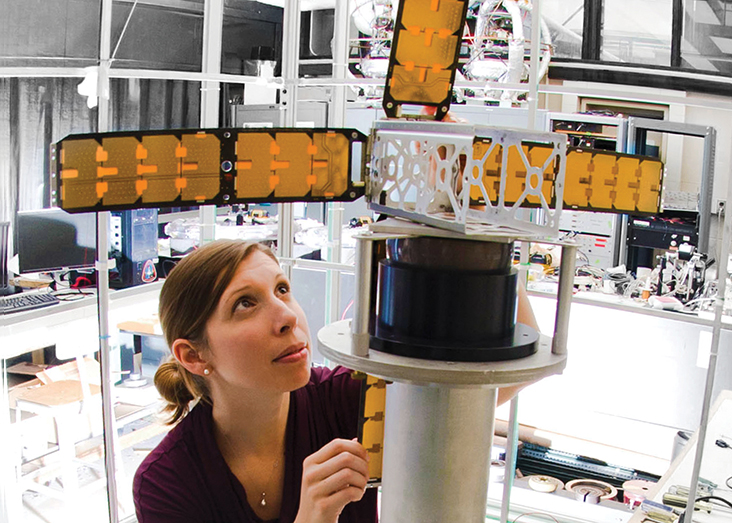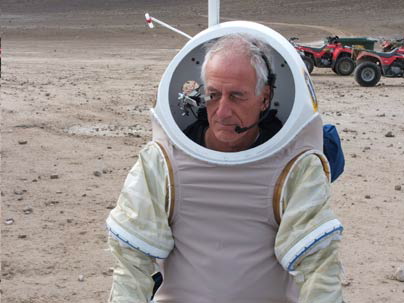Only at MIT can you do an MBA and specialize in aerospace engineering at the same time. Students who complete the LGO program through MIT Aeronautics and Astronautics are uniquely prepared for a leadership career in the aerospace industries. During their time at MIT, LGO Aero/Astro students are paired with a faculty advisor who helps them select courses, integrates them into the faculty’s research group, and oversees their LGO internship.
LGO students completing the MS in Aeronautics and Astronautics complete:
- The required courses in the LGO summer core focused on analytics, simulation and computation
- Engineering courses (at least four): each LGO Aero/Astro student works with a faculty advisor to select courses, some of which must be within the department, to fulfill academic and career goals.
- LGO internship incorporating Aeronautics and Astronautics content, resulting in a dual-degree thesis overseen by the student’s faculty advisor.
- Each LGO Aero/Astro student is paired with a faculty member at the time of admission who helps select courses that fulfill the department’s requirements and the student’s academic and career goals.
Aero/Astro (Course 16) is organized into several research areas that students can pursue:
- Autonomous Systems & Decision-Making
- Computational Science & Engineering
- Earth & Space Sciences
- Human-System Collaboration
- Systems Design & Engineering
- Transportation & Exploration
- Vehicle Design & Engineering
A full list of Course 16 classes can be found on the MIT Course Catalogue.
Popular research areas among LGOs:
Autonomous Systems & Decision-Making
Aero/Astro students focusing on Autonomous Systems focus on on developing embodied intelligent systems, ranging from autonomous drones to self-driving cars and robots, that can physically operate in complex environments with minimal human supervision. LGOs are exposed to foundational aspects of machine learning, control systems, and robotics.
- Key Areas of Research: Autonomy; Control; Guidance; Robotics; Navigation; Space and airborne communication networks; Estimation
- Sample of Classes: 16.413 Principles of Autonomy & Decision Making; 16.423 Aerospace Biomedical and Life Support Engineering; 16.440 Research Seminar: Human, Remote and Autonomous Systems in Air, Sea, and Space; 16.453 Human Systems Engineering; 16.485 Visual Navigation for Autonomous Vehicles
Systems Design & Engineering
This focus in Aero/Astro provides students with a foundational understanding of systems engineering principles and the tools to build technical, economic, and societal components into an integrated space system solution. The scope of operations LGO students can study includes the design and operation of critical infrastructures such as industrial manufacturing, transportation, earth observation, defense, water, energy, and food supply systems as well as the challenges of sustained human and robotic exploration and settlement of outer space.
- Key Areas of Research: System architecture; Lifecycle costing; Safety; In-space manufacturing; Optimization; Logistics; Access to space
- Sample of Classes: 16.842 Fundamentals of Systems Engineering; 16.863 System Safety Concepts; 16.888 Multidisciplinary Design Optimization; 16.89 Space Systems Engineering; 16.895 Engineering Apollo
Transportation & Exploration
Students interested in careers as researchers and practitioners in the areas of airline management, air transportation infrastructure design and analysis, and air transportation systems architecting can focus on this interdisciplinary research area.
- Key Areas of Research: Aviation; Flight information systems; Space missions; Infrastructure; Aircraft operations; Air traffic control; Instrumentation; Industry analysis
- Sample of Classes: 16.71 The Airline Industry; 16.75 Airline Management; 16.736 Air Transportation Operations Research; 16.781 Planning and Design of Airport Systems; 16.886 Air Transportation Systems Architecting
Many LGO partner companies offer research projects that satisfy Aero/Astro thesis requirements. These projects often focus on airplane manufacturing, unmanned aerial vehicles, satellites and space systems, or defense systems.
A few recent Aero/Astro internships were:
Mitch Johnson (LGO ’23)
Title: Parametric Study of Environmental Testing in Satellite Manufacturing
Partner Company: Amazon
John Barstow (LGO ’23)
Title: Application of System-Theoretic Analysis to Work Movement in Production Systems
Partner Company: Boeing
Connor Stehr (LGO ’22)
Title: Accelerating Adoption of Large-format Additive Manufacturing in Aerospace Tooling
Partner Company: American Industrial Partners
Michael Lunny (LGO ’22)
Title: Automation of NC Programming with Artificial Intelligence
Partner Company: American Industrial Partners
Juliette Chevallier (LGO ’21)
Title: Enabling Autonomy in Commercial Aviation: An Ontology and Framework for Automating Unmanned Aircraft Systems (UAS)
Partner Company: Boeing
Phil Cotter (LGO ’21)
Title: Implementing Large Format Additive Manufacturing in Aerospace Tooling via Process Integration and Finite Element Analysis of Print Performance
Partner Company: American Industrial Partners
The Aeronautics and Astronautics department looks for:
- A bachelor’s degree in any science or engineering discipline. Previous LGO Aero/Astro students have degrees in mechanical engineering, physics, chemical engineering, aerospace engineering, and systems engineering.
- Defined research interests in line with the Aero/Astro department’s research areas.
- All LGOs are paired with an Aero/Astro faculty advisor during the admissions process. To help in pairing, we ask Aero/Astro applicants to choose up to three graduate fields of study while applying. The fields of study you select should match your learning goals for the program.
- Previous project work in an Aero/Astro-related field is recommended. This does not need to be professional experience (successful candidates have cited undergraduate projects and internships, for example).
- The MIT Aero/Astro department strongly recommends that a former professor write the applicant’s technical recommendation.
Applicants should have a strong interest in Aero/Astro topics. Previous work experience in an aero/astro industry is nice, but any work experience is acceptable. We’ve also admitted applicants from the automotive, operations consulting, and IT services industries.
Of course, graduates from LGO finishing with a dual degree in Aero/Astro and management have interesting opportunities in the aerospace and satellites industries. Recent graduates work at Boeing and Raytheon, among other firms, and one even founded his own satellite company.
However, MIT “rocket scientists” have many career opportunities outside of aerospace. The robotics and systems optimization skills learned in Aero/Astro transfer to many industries. Recent graduates have also gone into electronics, renewable energies, healthcare services, and consulting.





